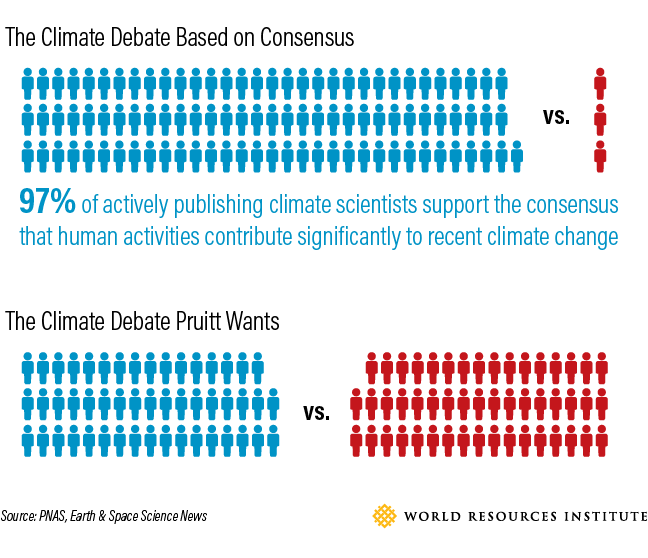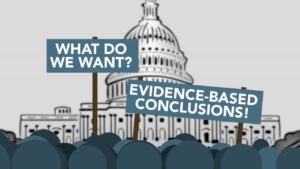
Environmental Protection Agency Administrator Scott Pruitt, Department of Energy Secretary Rick Perry, and others are calling for a red-team/blue-team (RT/BT) exercise to resolve differences of opinion regarding the science of global climate change. The approach is meant to resolve conflict through a structured debate. It is typically employed by military analysts and business strategists to improve decision-making and reach agreement on contested issues. Pruitt, Perry, and others assert that such an orchestrated process will bridge disagreements around climate change and build consensus.
There is little compelling evidence supporting that assertion. To the contrary, the proposal is likely to intensify conflict over climate science and policy, while needlessly undermining existing scientific and political institutions.
Many in the science community are speaking out emphatically against the notion of applying the RT/BT approach to climate science. President Obama’s science advisor, John Holdren, excoriated proponents of the idea in a recent Boston Globe op-ed, “The perversity of the climate science kangaroo court”. Holdren calls the proposal a “perversity” of the original intent leading to a “kangaroo court” for ulterior-motivated stone-throwers intent on obfuscating consensus science regarding the serious threat climate change poses.
In no other country has climate change become so politicized. A recent pollconducted by the Pew Research Center found that while residents of 13 countries ranked climate change as the greatest threat to national security, US residents tended to fear cyber-attacks and ISIS much more so than climate change. The study also found a deep partisan divide, with right-wing conservatives discounting the climate threat much more than those who identify as liberals or progressives.
Holdren strikes at the heart of the issue:
“The right wing’s ‘red team’ efforts have consistently been characterized by brazen cherry-picking misrepresentation of the findings of others, recycling of long-discredited hypotheses, and invention of new ones destined to be discredited,” he says. He notes that “[a]lmost none of this material has survived peer review to be published in the respectable professional literature.” He pointedly mentions that the RT/BT effort would be funded by American taxpayers.
One exchange on this topic occurred between Senator Al Franken (D-MN) and Secretary of Energy Rick Perry during a June 22, 2017 hearing of the Senate Committee on Energy and Natural Resources to examine the President’s budget request for the Department of Energy for Fiscal Year 2018 (see video of exchange). Sec. Perry defiantly insisted that carbon dioxide is not a main driver of global warming and pushed for a RT/BT process, asking, “What’s wrong with being a skeptic?” Sen. Franken replied:
“It’s my understanding that the blue team makes an argument and red team tries to knock it down and the blue team then refines their argument and they go back and forth until consensus is reached. But that’s exactly how science works – including climate science. Researchers collect data and make arguments, peer reviewers poke holes in the argument. The researchers respond. It goes back and forth until consensus is reached. Every peer review climate study goes through that red team, blue team treatment. And then thousands of studies have gathered into reports and those reports themselves go through rigorous red team-blue team and this is — that’s the scientific process.”
 Precisely: a perpetual red-team versus blue-team process is just another way to describe, albeit loosely, the scientific peer review process that is so inherent to the scientific method.Though, to be fair, there are rarely just two sides to a scientific disagreement: interpreting data can be tricky and nuanced, and oftentimes a certain amount of expert judgment is required. Pitting a relatively small group of climate deniers against members of the scientific community is as dishonest as it is simplistic.
Precisely: a perpetual red-team versus blue-team process is just another way to describe, albeit loosely, the scientific peer review process that is so inherent to the scientific method.Though, to be fair, there are rarely just two sides to a scientific disagreement: interpreting data can be tricky and nuanced, and oftentimes a certain amount of expert judgment is required. Pitting a relatively small group of climate deniers against members of the scientific community is as dishonest as it is simplistic.
This is not the first time adversarial proceedings have been proposed, and in some cases applied, to highly contentious and polarized issues involving science and policy. CSPW’s Senior Fellow Nicky Sundt studied the use of this method in the late 1970s while working on her MA degree at the University of California Berkeley’s Energy Resources Group (led at the time by John Holdren, then a young professor). Sundt’s 1979 Master’s thesis (.pdf), “Adversary Proceedings and Nuclear Policy: The Windscale Inquiry of 1977 ,” focused on an inquiry conducted in the United Kingdom to debate the merits of plans to build a nuclear-fuels reprocessing plant.
“The proceedings promised to settle some of the issues in a peaceful, discursive manner,” Sundt wrote. “Yet the lengthy inquiry did little to abate the controversy. Instead, it intensified the dispute over the construction of the plant and over nuclear power in general, while it undermined the legitimacy of traditional channels for resolving conflict.” Her analysis of the Windscale Inquiry and evidence from other such proceedings suggested that while some of the problems encountered are avoidable, there are “grave intrinsic problems” that likely will remain. “The use of adversary proceedings should therefore be avoided,” she concluded “while other consensus-developing alternatives are pursued.”
How is the Scientific Community Reacting to All of This?
Over time, scientists have been learning to push back and speak out even when it requires engaging in the political process – something most are loath to do. Those who have chosen careers in science and technology understand all too well that the scientific method itself is being called into question as a valid way to understand the world around us. They are so concerned about this development that they took to marching in the streets of Washington, DC, and elsewhere in early 2017. For many, it was their first science-focused protest.
 The Science March on April 22, and the Climate March a week later, are examples of a much larger and growing movement opposing the sudden and unexpected rise in power and influence of a group of people who play fast and loose with the truth. GAP and CSPW participated actively in the March for Science and continue to stay active in the movement to preserve and protect the scientific method from attack.
The Science March on April 22, and the Climate March a week later, are examples of a much larger and growing movement opposing the sudden and unexpected rise in power and influence of a group of people who play fast and loose with the truth. GAP and CSPW participated actively in the March for Science and continue to stay active in the movement to preserve and protect the scientific method from attack.
A group of scientists leading some of the nation’s top science organizations has sent a letter to EPA Administrator Scott Pruitt asking him for a meeting to discuss his support for a RT/BT exercise on climate science. Signatories on the letter include American Association for the Advancement of Science CEO Rush Holt, American Geophysical Union CEO Christine McEntee, American Institute of Biological Sciences interim co-Executive Director Robert Gropp, and American Society of Agronomy CEO Ellen Bergfeld. The July 31, 2017 letter (.pdf) states:
“As leaders of professional scientific societies with our collective membership of hundreds of thousands of scientists, we are writing in response to reports that you are working to develop a “red team/blue team” process that challenges climate science.
We write to remind you of the ongoing research, testing, evaluations, and debates that happen on a regular basis in every scientific discipline. The peer review process itself is a constant means of scientists putting forth research results, getting challenged, and revising them based on evidence. Indeed, science is a multi-dimensional, competitive “red team/blue team” process whereby scientists and scientific teams are constantly challenging one another’s findings for robustness. The current scientific understanding of climate change is based on decades of such work, along with overarching, carefully evaluated assessments within the United States and internationally.
As a reflection of that work, 31 scientific societies last year released a letter, updated from 2009, to reflect the current scientific consensus on climate change. We urge you to give its text consideration, along with America’s Climate Choices, the work of our premier United States scientific body, the National Academy of Sciences.
Of course, climate science, like all sciences, is an ever-changing discipline: our knowledge is always advancing. Robust discussion about data interpretation, methodology, and findings are part of daily scientific discourse. That is how science progresses. However, the integrity of the scientific process cannot thrive when policymakers—regardless of party affiliation—use policy disagreements as a pretext to challenge scientific conclusions.
Given your interest in the state of climate science, we would welcome the opportunity to meet with you to better understand your perspective and rationale for the proposed activity; and to discuss climate science, including which areas are at the frontiers of scientific knowledge and which are well-established because of thousands of studies from multiple lines of evidence.
We look forward to hearing from you… to coordinate a meeting.”
If Mr. Pruitt is asked, we strongly recommend he take the meeting.
CSPW Senior Climate Policy Analyst Anne Polansky has 30 years of experience in public policies relating to energy and the environment, with a strong focus on climate change and renewable energy. She is a former Professional Staff Member of the House Committee on Science, Space and Technology.
Nicky Sundt is CSPW’s Senior Fellow. She is an expert on energy and climate change with over 35 years of experience and accomplishment in government, non-governmental organizations, and the private sector. During the four-month fellowship, Nicky will watch over and report on key US federal climate science obligations under law – especially those relating to communications to the President, Congress, and the public.

